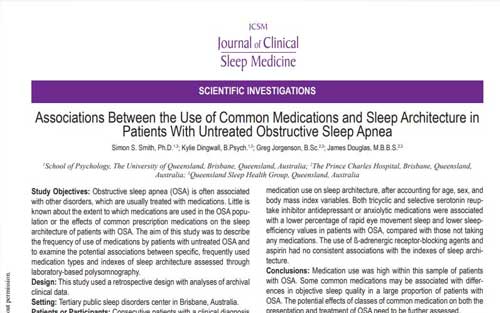
Use of Common Medications and Sleep Architecture in Patients With Obstructive Sleep Apnea
Do anti-depressants affect your quality of sleep when you suffer from OSA?
Little is known about the extent to which medications are used in the OSA population or the effects of common prescription medications on the sleep
architecture of patients with Obstructive Sleep Apnea. This is the object of this study.
Study Objectives: Obstructive sleep apnea (OSA) is often associated with other disorders, which are usually treated with medications. Little is known about the extent to which medications are used in the OSA population or the effects of common prescription medications on the sleep architecture of patients to examine the potential associations between specific, frequently used medication types and indexes of sleep architecture assessed through laboratory-based polysomnography.
Study Conclusions: Conclusions: Medication use was high within this sample of patients with OSA. Some common medications may be associated with differences in objective sleep quality in a large proportion of patients with OSA. The potential effects of classes of common medication on both the presentation and treatment of OSA need to be further assessed.
Introduction: Sleep involves a complex interaction between central neurophysiologic mechanisms and more peripheral cardiac and respiratory feedback mechanisms. The pathophysiologic features associated with obstructive sleep apnea (OSA) and the use of common medications that target cardiopulmonary or central neurophysiologic mechanisms are likely to alter or disrupt normal sleep processes. Despite the frequent community use of prescription and nonprescription medications,2,3 there is a great deal of missing information on the effect that specific medications have on sleep architecture in populations with OSA, and, in fact, there are no available data for many medications.
Publication: Journal of Clinical Sleep Medicine, Vol. 2, No. 2, 2006

